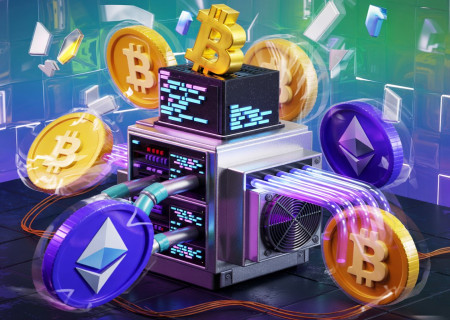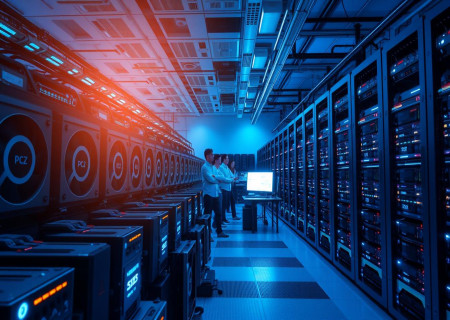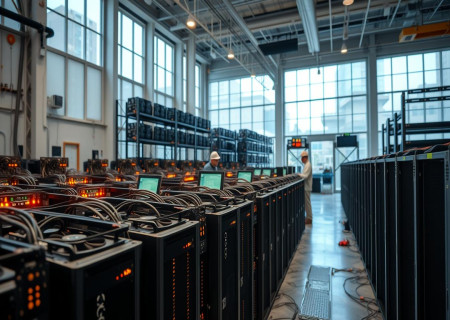
- April 14, 2025
- 9 months ago
Free & Paid Bitcoin Mining Pools: Which One is Right for You?
The sphere of cryptocurrencies is continually evolving. It revolves mostly around Bitcoin Mining Pool. Your income might be considerably influenced by the pool you choose.
One can find a lot of options available. Many times, Miners question if they should choose paid or free mining pools. This selection heavily relies on your expected returns, hardware capabilities, and mining goals as well as on
The free and paid Bitcoin mining pools will be contrasted in this paper. Our goal is to enable you to make the best decision for yourself.
What Are Bitcoin Mining Pools and Why Use Them?
The mining scene has been altered by bitcoin mining pools. For miners around, they simplify and increase the profitability of mining. Groups of miners cooperating are known as bitcoin mining pools. They complete challenging arithmetic tasks on their computers and get bitcoin incentives.
Working together helps miners to have a consistent income. The environment of bitcoin mining depends on this kind of teamwork.
The Purpose of Mining Pools
Mining pools play various significant functions. They allow miners share resources and lower the dangers of single mining. In this sense, miners have a consistent income. According to experts, "bitcoin mining depends on mining pools. They enable miners to participate more effectively in a competitive market.
"For bitcoin mining, the mining pool idea has been a game-changer and more feasible for a greater spectrum of players."
Solo Mining vs. Pool Mining
Solo mining is the competition among miners to solve arithmetic challenges alone. Pool mining enables miners band together to raise their odds of success. Solo and pool mining is compared here:
| Characteristics | Solo Mining | Pool Mining |
| Resource Utilization | Individual resources | Combined resources |
| Reward Distribution | All or nothing | Shared among participants |
| Income Stability | High variance | More consistent income
|
Top Free Bitcoin Mining Pools
Free Bitcoin mining pools are popular because they save money. Miners pool their resources to solve complex math problems. This way, they earn Bitcoin rewards together.
Here are some top free Bitcoin mining pools:
Slush Pool
Slush Pool is one of the oldest and most trusted pools. It uses a pay-per-share model, rewarding miners fairly. Its easy-to-use interface and strong security make it a top choice.
F2Pool
F2Pool is well-known in the mining pool world. It offers many mining options and is big globally. It's known for low fees and clear payouts.
Antpool
Antpool is huge, backed by Bitmain, a top mining hardware maker. It provides various mining services and is known for reliability and security.
Advantages and Limitations
Free pools like Slush Pool, F2Pool, and Antpool have big benefits. They cost less and are easier to join. But, they also have downsides like lower payouts and security risks. Miners need to think about these when picking a pool.
- Advantages: Lower costs, easier access, and community support.
- Limitations: Lower payouts, security risks, and less control over mining.
Leading Paid Bitcoin Mining Pools
Miners looking for more can find paid Bitcoin mining pools appealing. These pools provide advanced features and support. They help improve mining efficiency and earnings.
Luxor
Luxor is a top paid mining pool. It's known for its user-friendly interface and low fees. Luxor has mining plans for all types of miners.
Poolin
Poolin is a big name in paid mining pools. It offers advanced analytics and great customer support. Its global presence makes it a favorite among miners.
ViaBTC
ViaBTC is known for its reliable service and fair payouts. It supports many cryptocurrencies. This makes it a good choice for miners.
Benefits and Drawbacks
Paid mining pools offer enhanced features and better support. They can also lead to higher earnings. But, they charge fees that can reduce profits. Miners need to consider these points when picking a pool.
How to Choose the Right Bitcoin Mining Pool
Selecting the right Bitcoin mining pool is a key decision for miners.
Choosing a Bitcoin mining pool involves many factors. Miners must consider several aspects to find a pool that fits their goals and boosts their earnings.
Fee Structures Explained
Mining pools charge fees for their services, affecting a miner's earnings. Fee structures differ, with some pools charging a fixed fee per block and others a percentage of the reward.
For example, Slush Pool charges a fee on the reward. Others have more complex fee structures. It's important to understand these fees to maximize profits.
Payout Methods and Thresholds
Payout methods and thresholds are key. Pools offer different payout structures, like Pay-Per-Share (PPS) or Proportional, and set minimum payout thresholds.
Miners should pick a pool with a payout method and threshold that matches their mining operation's size and frequency.
Pool Reliability and Uptime
The reliability and uptime of a mining pool are critical. A pool with high uptime ensures efficient use of mining equipment.
Miners should look for pools with a stable history and minimal downtime.
Geographic Considerations
Geographic location also matters. Miners should choose pools with servers near them to reduce latency.
To show the differences between mining pools, here's a comparison table:
| Mining Pool | Fee Structure | Payout Method | Uptime |
| Slush Pool | Fee on reward | PPS | 99.9% |
| F2Pool | Competitive fees | Proportional | 99.8% |
| Luxor | Transparent fees | PPS+ | 99.95% |
By carefully evaluating these factors and considering their mining operation's needs, miners can make a well-informed choice when picking a Bitcoin mining pool.
Step-by-Step Guide to Setting Up Your Mining Pool Connection
Connecting to a Bitcoin mining pool is easy with a few steps. This guide will help you set up to mine Bitcoin well.
Required Hardware Setup
A strong hardware setup is key for Bitcoin mining. You need a fast internet, a strong ASIC miner, and good cooling to avoid overheating.
Software Configuration
After your hardware is ready, set up your mining software. CGMiner and BFGMiner are top choices. They have cool features like remote interface capabilities and dynamic clocking.
Connecting to Your Chosen Pool
To join your mining pool, enter the pool's URL, username, and password in your software. Make sure the info is right to avoid problems.
Verifying Successful Connection
Check if your mining rig is working by looking at the pool's dashboard. A good connection shows an active worker and reported hashes.
"A well-configured mining setup is key to maximizing your Bitcoin mining rewards." -
Expert Miner
Maximizing Your Bitcoin Mining Pool Earnings
To make more money from Bitcoin mining, you need to use smart strategies. These strategies help you work better and earn more.
Your hash rate is key to earning more. A higher hash rate means you can solve the complex math problems faster. This leads to more Bitcoins mined.
Optimizing Hash Rate
To boost your hash rate, make sure your mining gear is top-notch. Keep your mining software up to date and keep your hardware in good shape. Also, using high-performance mining hardware can really help.
Managing Electricity Costs
Keeping electricity costs down is also vital. Bitcoin mining uses a lot of energy. So, cutting down on electricity costs can greatly increase your profits. Look into mining in areas with cheaper electricity or use renewable energy to save money.
Strategic Pool Switching
Switching mining pools wisely is another smart move. Keep an eye on how different pools perform and switch to the best one. Know about pool fees, payout structures, and pool reliability to make smart choices.
Conclusion
Choosing the right Bitcoin mining pool is key to making money. You need to know about free and paid options. Look at fees, how you get paid, and how reliable the pool is.
Top pools like Slush Pool, F2Pool, and Luxor have their pros and cons. You can boost your earnings by improving your hash rate and controlling electricity costs. Use what you learned to find the best pool for you and succeed in Bitcoin mining.
FAQ
What is a Bitcoin mining pool?
A Bitcoin mining pool is a group of miners. They work together to solve complex problems. This way, they increase their chances of earning Bitcoins.
How do I choose the best Bitcoin mining pool for my needs?
Look at the pool's fee structure and payout methods. Also, check its reliability and location. Make sure it fits your mining goals and situation.
What are the differences between free and paid Bitcoin mining pools?
Free pools often have higher fees or limits. Paid pools have lower fees and more features. They require a payment or subscription upfront.
How do I set up a connection to a Bitcoin mining pool?
First, set up your mining hardware and software. Then, create an account with the pool. Follow their instructions to connect your miner.
What is hash rate, and why is it important in Bitcoin mining?
Hash rate is your mining equipment's power. A higher hash rate means better chances of solving problems and earning Bitcoins.
Can I switch between different Bitcoin mining pools?
Yes, switching pools is possible. But, think about fees, payout thresholds, and the cost of your mining equipment.
How do I maximize my earnings from a Bitcoin mining pool?
Boost your earnings by optimizing your hash rate and managing electricity costs. Also, switch pools strategically to find the best conditions.




